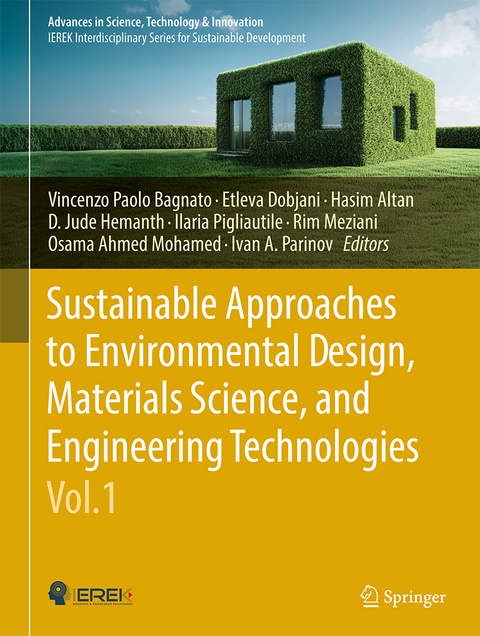
Sustainable Approaches to Environmental Design, Materials Science, and Engineering Technologies, Vol.1
Springer International Publishing (Verlag)
978-3-031-76024-2 (ISBN)
- Noch nicht erschienen - erscheint am 31.01.2025
- Versandkostenfrei
- Auch auf Rechnung
- Artikel merken
This book highlights the sustainable innovation in environmental design, materials science, and engineering technologies. It provides a multidisciplinary approach to addressing contemporary challenges in creating resilient, efficient, and health-promoting built environments. With contributions from leading experts, the book covers a wide range of topics including architectural design, urban planning, sustainable materials, and renewable energy technologies. Also, it explores sustainable solutions and innovative practices across a range of disciplines essential for the future of our built environment. It examines architectural design, urban planning, and infrastructure, highlighting approaches that promote resilience and efficiency in urban settings. The book aligns with sustainable development goals, providing practical insights and strategies to achieve global sustainability targets. This book focuses on sustainable methodologies in material sciences, exploring the latest advancements in eco-friendly materials and their applications in construction. The integration of renewable energy technologies is thoroughly examined, showcasing how these innovations can reduce environmental impacts and enhance energy efficiency. Additionally, the book addresses the crucial theme of environmental integration and impacts, presenting comprehensive studies on the intersection of engineering technologies with environmental sustainability. Furthermore, it is an indispensable resource for professionals, researchers, and students dedicated to fostering sustainable development across multiple fields. It offers valuable guidance on implementing sustainable practices to create a healthier and more sustainable world.
1. Architectural Design, Urban Planning and Infrastructure. - Design and Evaluation of Lightened Solid Objects Through Topology Optimization and Application of Functionally Graded Voronoi Structures. - Towards a Healthy City. The Urban Image of Post-Traumatic Cities: Impact on Brain Mechanics and Inhabitants' Wellbeing. - Creating Healing Spaces: A Biophilic Framework for Designing the Physical Interior Environment of Healthcare Facilities. - Building Better Lives for Refugees: A Call for Sustainable Urban Camps. (comparative study on Al Azraq and Kutupalong refugee camps. - Nudge at the service of design for a better world: Perspectives and Challenges. - Feature Engineering for Short Term Residential Load Forecasting Using RNN-based Neural Networks. - Composition and its Contribution to the Visual Perception of the Building. - The role of green office spaces in promoting employees' cognitive functioning. - Estimation of a Household Trip-Based Generation Model for the State of Michigan. - Dockless Bike-sharing System Perceptions Across Gender in Dayton Using Unstructured Textual Data Mining Techniques. 2. Sustainable Development Goals and Practices - Assessing Main Social Sustainability Indicators in The Designs of The Three Recent Trendy 'Sustainable Cities' in UAE. - Placemaking, spatial behavior, and community interactions: Lessons on social housing and sustainability. The case of Al Ain City, UAE. - Aquaculture Sludge Treatment: Leveraging Aspergillus Niger For Protease Production Through Solid State Fermentation. - Revitalizing Waste: Sustainable Forest Biomass for Advanced Water Remediation Resources. - Impact of Organic Composition on Anaerobic Digestion: A Mini Review. - Experimental Testing of Camel Manure as a Potential Feedstock for Aerobic Composting. - Heat activation persulfate in the presence of frequency-based ultrasonic for oxidation of a bio-recalcitrant contaminant "Rhodamine B". - CO2 emissions saving potential of the novel technology for pipe production waste recycling without remelting: a case study. - Water Resource Management in Vulnerable Coastal Regions. 3. Sustainable Methodologies of Material Sciences - New Trends in Sustainable Concrete Industry Using Aggregate Replacement. - Carbonation Resistance of Concrete with Alkali-activated Fly ash and Slag Binders: A Focused Review. - Utilizing Construction and Demolition Waste as Recycled Aggregates in Sustainable Building Practices. - Flexural and Splitting Tensile Strengths of Sustainable Concrete with Natural and Recycled Air-cooled Blast Furnace Slag Aggregates. - Using Plastic PET Bottles in Concrete as Reinforcing Fibres. - UPGRADING EARTHEN MATERIALS USING LOW-TECH NATURE-BASED SOLUTIONS. - Synergistic Enhancements in Additive Manufactured PolyLactic Acid Orthopedic Cortical Screws: Nano Coating Strategies and Comparative Performance Analysis. - Investigating the Effect of adding Cyanoacrylate Adhesive on Dovetail and Screw Joints in PLA- FDM 3D prints. - Numerical Investigation of Heat Transfer in Circular Tubes Fitted with Twisted Tape and Rings Insert. 4. Renewable Energy, Environmental Integration and Impacts - Net Zero Emissions Buildings, Shifting the focus from energy efficient to whole life carbon emission: A review study. - Thermal Performance Enhancement of Roughened Solar Air Heater for Space Heating and Drying Agro Product. - Optimal Storage Design of Distributed Power Flow System Considering Incremental Power Load. - Optimizing the Performance of Low Concentrator Photovoltaic Cells using Response Surface Methodology. - Localization of Photovoltaic Module Defects based on Infrared images. - Irrigation water in the arid environment: current trends and future perspectives. - Evapotranspiration Model & Crop Water Requirements: Implications for Agricultural Sustainability. - Sustainable Agriculture Systems Transformed: The Role of Drones in Enhancing Precision, Safety and Efficiency.- Enhancing Hand Gesture Control Using 3DCNN-LSTM Approach.
| Erscheint lt. Verlag | 31.1.2025 |
|---|---|
| Reihe/Serie | Advances in Science, Technology & Innovation |
| Zusatzinfo | Approx. 500 p. 90 illus., 45 illus. in color. |
| Verlagsort | Cham |
| Sprache | englisch |
| Maße | 210 x 279 mm |
| Themenwelt | Naturwissenschaften ► Biologie ► Ökologie / Naturschutz |
| Naturwissenschaften ► Geowissenschaften | |
| Schlagworte | architectural design • Environmental Integration • Infrastructure • Organic Composition • renewable energy • Sustainable Agriculture Systems • Sustainable Development Goals • urban planning • Water resource management |
| ISBN-10 | 3-031-76024-7 / 3031760247 |
| ISBN-13 | 978-3-031-76024-2 / 9783031760242 |
| Zustand | Neuware |
| Haben Sie eine Frage zum Produkt? |
aus dem Bereich


